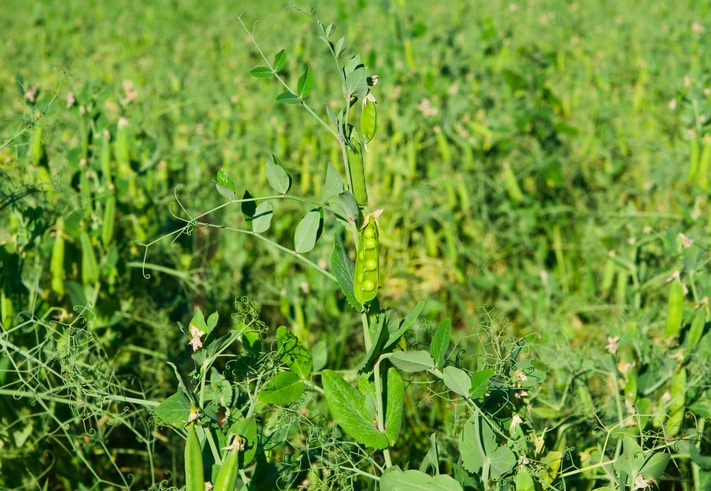
It’s less water intensive to grow than other protein sources, and healthier for the soil. It’s naturally non-GMO and free of common allergens. Sales of it grew 30 percent in 2015, according to SPINS. And it’s in everything these days from meat substitutes to peanut butter.
It’s pea protein, and Iowa-based World Food Processing is betting big on it. The company, which started in 1985 as a soybean seed breeding company, began breeding peas about two decades ago, commercialized its pea protein isolate, PURISPea, in 2014, and recently expanded its manufacturing facility to keep up with growing demand.
What makes this pea protein purveyor unique is its proprietary seed breeding techniques that allow it to grow crops in regions outside of Canada—where most of the peas grown in North America come from. That, and the company’s closed-loop business model, which CEO Tyler Lorenzen says ensures a pure and transparent supply chain.
We caught up with Lorenzen to see why peas are such a great crop, and how his company equips farmers, ingredient suppliers and manufacturers for success. He'll share more at this year's Esca Bona conference in October.
Can you explain how your business is structured and what World Food Processing does?
 Really the whole business is framed around non-GMO and organic and always has been. It starts with our seed breeding and what we call protein independence—so, the ability to develop proprietary seeds using natural breeding methods in different areas around the world and in the United States, so that farmers have the best technology. Then we tie that to a closed-loop model where we take seeds from fields, we bring non-GMO and organic grains back in and we process those into different ingredients and applications and use every fraction of the product.
Really the whole business is framed around non-GMO and organic and always has been. It starts with our seed breeding and what we call protein independence—so, the ability to develop proprietary seeds using natural breeding methods in different areas around the world and in the United States, so that farmers have the best technology. Then we tie that to a closed-loop model where we take seeds from fields, we bring non-GMO and organic grains back in and we process those into different ingredients and applications and use every fraction of the product.
Our legacy business is in soy, and our up-and-coming business is in peas. The whole concept of protein independence for us is, how can we make plants in the field be more suitable to make great-tasting food, and then how can we make a process and parameters in our facilities that can yield the cleanest and best-tasting ingredients that are the proper functionality for a given food application?
Our view of the world is that you don’t need to buy protein from massive regions globally and then ship it all around the world, but rather you can have the ability to procure your protein locally, so you can see where it’s coming from and that it’s a safe and sustainable supply chain. We want to make sure that not only can we feed the world today but provide solutions for a growing world tomorrow.
We’ve seen pea protein explode in the marketplace over the past couple of years—why do you think that is?
We got into peas because of their ability to be sustainable with our other farmers in Southern regions of the United States. Peas are cool-weather crops—they grow in 90-day seasons and can sprout when the soil is very cold and they can survive a snow. We thought an opportunity existed: Can we take something that typically grows in Canada or in the northern United States and drag that technology down further south? For some of these places where they’re looking for a multi-crop solution, specifically for organic farmers, how can we use peas as a cover crop that’s in fact a cash crop in the winter months, harvest that, and then come back with their standard cash crops in the summer? It’s an opportunity to increase profitability for farmers, but then it also does something to the soil. You’re planting a legume—they’re nitrogen fixating, so they take nitrogen from the air and, with their relationship with the bacteria in the soil, they convert that nitrogen into usable fertilizer. It really drives the ability for organic farmers to have a more sustainable system.
That was why we got into it, but then, through that process we saw soy go from being similar to peas—being natural non-GMO and organic—to the development of GMOs, and it really changed the landscape and slowly GMOs kind of took over everything. We saw the opportunity was in giving customers and consumers a product that is free from all of those things that may not be what they’re looking for—peas are not a major allergen, and they’re naturally non-GMO, and they’re extremely sustainable.
So we’re in a unique situation where a legume is able to fulfill what soy used to do, and it checks every clean-label box for consumers. Then if you can deliver on flavor, which is where I think we are able to really put our best food forward, that’s something that people will come back for.
There still seems to be some confusion in the marketplace about breeding versus genetic modification. Do you have a simple way of explaining it?
GMOs are when two unlike species are crossed together—so this would be crossing soybeans with a rose plant. Non-GMO hybrids are when two like species make another—a pea is crossed with a pea to make a new pea. A GMO is made is a lab, versus doing it out in the field in a natural environment utilizing pollen, how nature intended.
Breeding a seed for a different climate must be incredibly complex. What kind of data goes into that?
We have localized breeding efforts, so we go in different procurement areas that may want alternative crops to go, and we do tests of breeding plants for just there. So this is literally trial and error. We’re in the fields, we’re selecting based on the environmental conditions, yield—any agronomic characteristic you can think of—and trying to mix and match our databank of genomes and make sure that the best ones are together. It’s a lengthy process—it could take up to seven years to complete a variety.
About the Author(s)
You May Also Like




